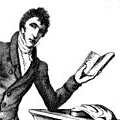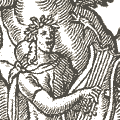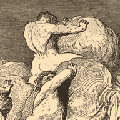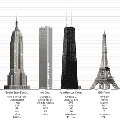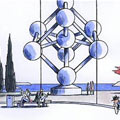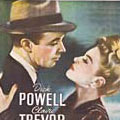The Beatles’ records and the sixties
 Revolution in the Head met daarin een analyse van alle 178 Beatles songs verscheen voor het eerst in 1994 en is sindsdien een onmisbaar standaardwerk geworden. McDonald stierf in augustus 2003 terwijl de derde druk nog in voorbereiding was, bijna een jaar na het overlijden van George Harisson. Als naslagwerk heeft de derde druk uit 2005 nu een vaste plek gekregen bij mij naast de Beatles LP’s onder mijn draaitafel. Elk Beatlesnummer wordt door McDonald van zowel historisch als muziektechnisch commentaar voorzien en daarbij komen de gegevens over de bezetting en opnamedata. McDonald oogste ook kritiek met zijn benadering. Alles wat er na 1970 in de muziek gebeurd is, blijft voor hem slechts een verwerking van wat er in het decennium daarvoor gemaakt is. Ik vind dat trouwens wel een aantrekkelijke tunnelvisie. De popmuziek uit de sixties is waarschijnlijk de invloedrijkste uitdrukkingsvorm van de counter culture, die sindsdien mainstream is geworden voor bijna iedereen die na 1945 geboren is. En die tegencultuur was doordrenkt van geestverruimende middelen die de revolution in the head een handje hielpen.
Revolution in the Head met daarin een analyse van alle 178 Beatles songs verscheen voor het eerst in 1994 en is sindsdien een onmisbaar standaardwerk geworden. McDonald stierf in augustus 2003 terwijl de derde druk nog in voorbereiding was, bijna een jaar na het overlijden van George Harisson. Als naslagwerk heeft de derde druk uit 2005 nu een vaste plek gekregen bij mij naast de Beatles LP’s onder mijn draaitafel. Elk Beatlesnummer wordt door McDonald van zowel historisch als muziektechnisch commentaar voorzien en daarbij komen de gegevens over de bezetting en opnamedata. McDonald oogste ook kritiek met zijn benadering. Alles wat er na 1970 in de muziek gebeurd is, blijft voor hem slechts een verwerking van wat er in het decennium daarvoor gemaakt is. Ik vind dat trouwens wel een aantrekkelijke tunnelvisie. De popmuziek uit de sixties is waarschijnlijk de invloedrijkste uitdrukkingsvorm van de counter culture, die sindsdien mainstream is geworden voor bijna iedereen die na 1945 geboren is. En die tegencultuur was doordrenkt van geestverruimende middelen die de revolution in the head een handje hielpen.
MacDonald begins by remarking that the 1960s was the decade in which various cultural phenomena that had been current in elite circles for some time came to spread throughout society. The most significant of these was the collapse of religious belief in favour of a materialistic viewpoint that, according to MacDonald, eroded the idea that happiness was to be deferred until the afterlife, or for future generations. This viewpoint fostered the notion that instant gratification is permissible and is, in any event, made feasible by a period of economic well-being, and by technological developments that made available a wide range of pleasure-giving goods and services – from labour-saving domestic devices to hi-fi systems and hallucinogenic drugs. In short, the deferential, staid 1950s gave way to the sensual, libertarian 1960s.
Bron: Revolution in the Head [en.wikipedia.org]
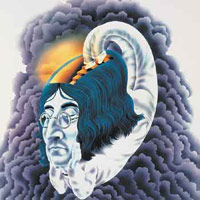 Het psychedelische jaar 1967 kwam niet zomaar uit de lucht vallen. In de eerste helft van de zestiger jaren waren de voortekenen al zichtbaar. Voor The Beatles zorgden Rubber Soul (1965) en Revolver (1966) voor de grote ommekeer, de weg naar binnen. Ook heel letterlijk. De reden waarom de band vanaf eind 1965 de studio indook had een even praktische als banale oorzaak. Door de constante massahysterie in het publiek konden ze zichzelf niet meer horen spelen! De weg naar binnen werd paradoxaal ook een weg naar buiten, een ontdekkingsreis door onbekende werelden met tangerine trees and marmalade skies
Het psychedelische jaar 1967 kwam niet zomaar uit de lucht vallen. In de eerste helft van de zestiger jaren waren de voortekenen al zichtbaar. Voor The Beatles zorgden Rubber Soul (1965) en Revolver (1966) voor de grote ommekeer, de weg naar binnen. Ook heel letterlijk. De reden waarom de band vanaf eind 1965 de studio indook had een even praktische als banale oorzaak. Door de constante massahysterie in het publiek konden ze zichzelf niet meer horen spelen! De weg naar binnen werd paradoxaal ook een weg naar buiten, een ontdekkingsreis door onbekende werelden met tangerine trees and marmalade skies
Revolution in the Head bevat een chronologie van bijna 80 pagina’s van januari 1960 (The Quarry Man) tot december 1970 (het officiële einde van The Beatles), met daarin van maand tot maand alle belangrijke data over The Beatles, de overige (pop)muziek en politieke en culturele gebeurtenissen.
The Beatles Channel [ youtube.com ] | The Beatles [nl.wikipedia.org] | thebeatles.com

